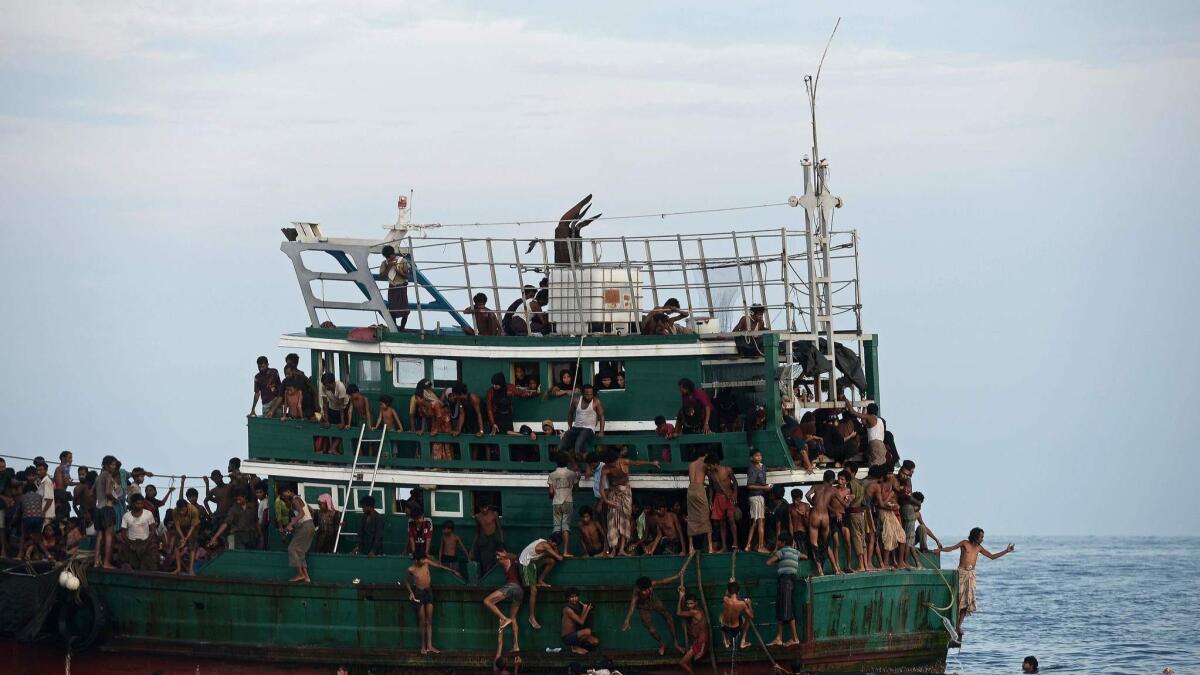Op-Ed: I was born stateless and persecuted in Myanmar. Here is what it took for me to come to the U.S.

- Share via
I arrived in Chicago this spring, one of a handful of refugees sent to the United States under an agreement with Australia. I’m enjoying my freedom here and looking forward to the chance to get an education and a job and, at last, to lead a normal life after years spent looking for a country to call my own.
My journey here has been a long one.
I was born in 1994, in Myanmar, to Rohingya parents. Although Rohingya have lived in Myanmar for generations, the government refuses to recognize us as one of the eight “national indigenous races” and we face constant persecution as stateless people.
When I was 16, I left Myanmar by boat, passing through Bangladesh, Malaysia, Indonesia, Australia and Papua New Guinea. I was detained in Indonesia for 17 months and on Papua New Guinea’s Manus Island for almost five years by the Australian government.
In 2013, Australia proclaimed that any asylum-seekers arriving by boat would never enter its country. Since then, it has sent thousands to Manus Island and the island nation of Nauru. The government said it was trying to prevent more dangerous boat crossings and drownings at sea.
It trapped people like me on land, consigning us to prison-like camps.
On Manus Island, every day was filled with trauma. We were treated like animals by the security guards and some of us were beaten by local people, but no action was taken. We did not receive proper medical attention. We had to beg for the privilege of a phone call.
We were treated like animals by the security guards and some of us were beaten by local people, but no action was taken.
One day I made a request to call my uncle, who was ill and near death. My case worker went to her boss and he went to his boss for permission. It took two days, and by that time, my uncle had passed away.
All the while, the Australian government threatened forcible deportation, indefinite incarceration and resettlement in Papua New Guinea, where we are not wanted. Our hopes would rise when caring people fought for us in protests and in legal proceedings, and crash when international attention drifted to some other problem in some other place.
We spent our time worrying about our survival, safety and our loved ones whom we had left behind. We lost interest in improving our lives, because we couldn’t see any future. Depression, boredom and fear affected us day and night, and all this continues for those who are still held captive.
For years, Australia has looked for places to send the people it has trapped on these islands. The United States agreed in 2016 to take around 1,250 refugees, and I was one of the lucky ones.
The process began on March 3, 2017, when an officer from the International Rescue Committee’s Resettlement Support Center interviewed me. My biometric information was collected a month later. I was then scheduled for another interview, in August, this time with officers from the U.S. Department of Homeland Security. In September, I was called for a mandatory medical examination and U.S. health screening. My refugee application was finally accepted in December.
Enter the Fray: First takes on the news of the minute from L.A. Times Opinion »
Also in 2017, while my fortunes were taking a turn for the better, my family had to flee Myanmar due to a brutal military assault on the Rohingya people and now have no clue what the future will bring.
In Chicago, I think of them, and I think of my friends left behind on Manus Island. They live in centers dotted around the town of Lorengau without any assurance of safety and increasingly restricted in their movements. A new curfew means they can’t leave the campgrounds from 6 p.m. to 6 a.m.
I am happy to be in the United States, hopeful and motivated for the future. I want to study and work so that I can create something wonderful out of this gift of freedom. I am grateful that the Trump administration honored the agreement reached previously with the Australian government, to accept selected men, women and children from Manus and Nauru. But many people, many of my people, have been left behind.
Imran Mohammed is a stateless refugee from Myanmar living in the United States.
Follow the Opinion section on Twitter @latimesopinion or Facebook.
More to Read
A cure for the common opinion
Get thought-provoking perspectives with our weekly newsletter.
You may occasionally receive promotional content from the Los Angeles Times.









